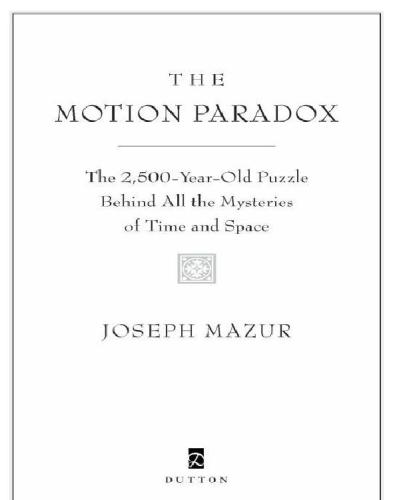
The Motion Paradox
The 2,500-Year Old Puzzle Behind All the Mysteries of Time and Space
کتاب های مرتبط
- اطلاعات
- نقد و بررسی
- دیدگاه کاربران
نقد و بررسی

February 12, 2007
The Greek philosopher Zeno sought to reveal that motion and speed were logical impossibilities; one of his famous four paradoxes argued that a moving object can never reach its destination, because it must first travel half the distance, then half the remaining distance, and so on. In this entertaining, informative diversion, Mazur (Euclid in the Rainforest
) spins out the discoveries of the mathematicians and scientists who have grappled with the riddles of time and space over the last two millennia, from Aristotle up to Heisenberg and contemporary string theorists. Yet for all their answers, the fundamental premise that motion is an illusion created by consciousness still remains. Many elements of the story, such as the astronomical breakthroughs of Galileo and Tycho, or the simultaneous development of calculus by Leibniz and Newton, have been discussed in greater detail in other recent books. But Mazur spins a good yarn, and his conversational tone holds readers' attention even as the mathematical formulae pile up in later chapters.

March 1, 2007
Zeno's four paradoxes have bamboozled the greatest mathematical minds, for he purported to prove that motion is impossible, a conclusion somewhat at variance with experience. In this history of puzzlement over the paradoxes, mathematician Mazur begins by imagining Zeno stumping the entire ancient-Greek brain trust except for Aristotle, who offered refutations of Zeno. With Aristotle's own notions of motion refuted by Kepler, Galileo, and Newton, Zeno enjoyed a brief renaissance but seemed tamed once more by calculus and its mathematical tool kit. Motion and time again were continuous, not infinitely divisible, which is the underlying assertion that lets Zeno claim that fleet-footed Achilles can never catch up to a tortoise that has a head start. Then, as Mazur relates, Planck's discovery of the quantum, and Einstein's of relativity, restored Zeno's paradoxes to philosophical relevance. Entrained with some requisite algebra, Mazur's account achieves an entrancing verbal clarity in its discussion of the success and limits of mathematically modeling motion, and itself is a fine example of popularizing a famous philosophical mind-bender.(Reprinted with permission of Booklist, copyright 2007, American Library Association.)

























دیدگاه کاربران